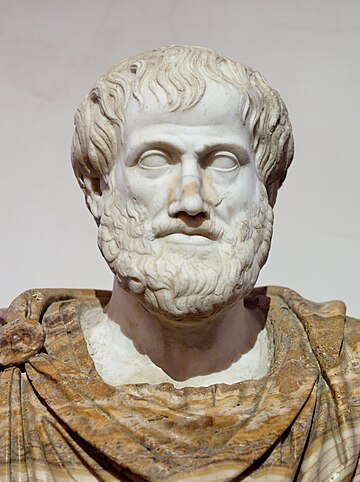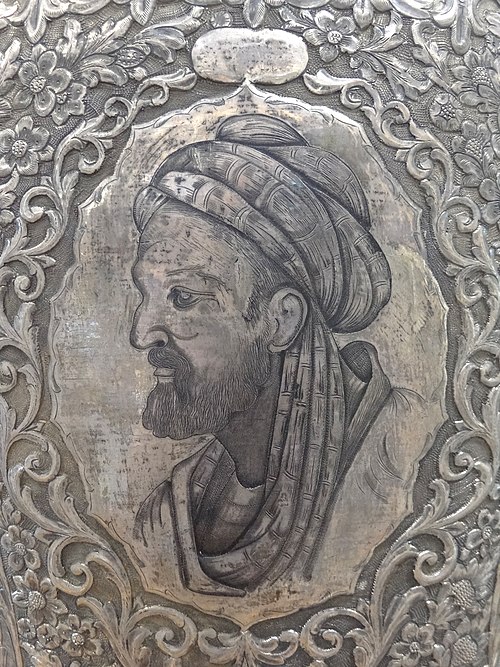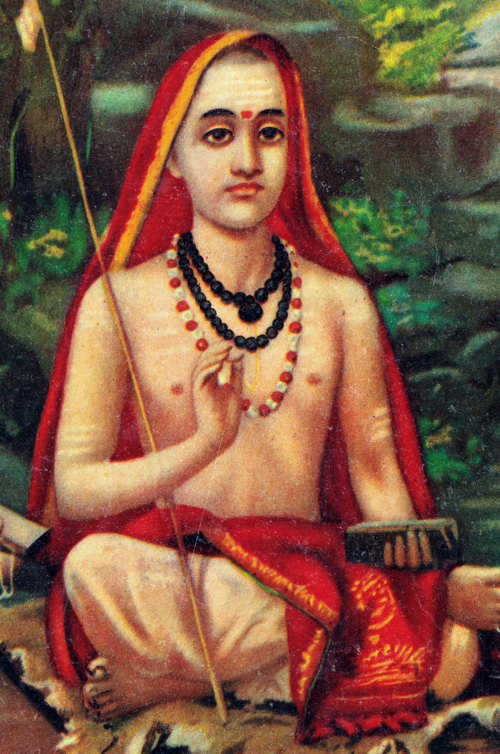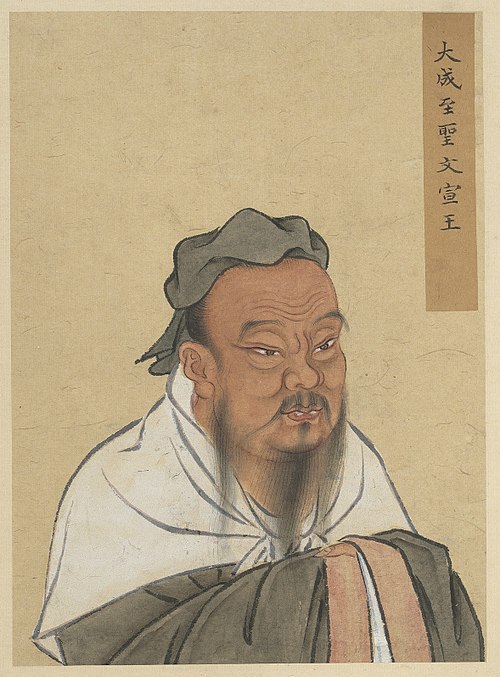HISTORY
As a discipline, the history of philosophy aims to provide a systematic and chronological exposition of philosophical concepts and doctrines.[38] Some theorists see it as a part of intellectual history, but it also investigates questions not covered by intellectual history such as whether the theories of past philosophers are true and have remained philosophically relevant.[39] The history of philosophy is primarily concerned with theories based on rational inquiry and argumentation; some historians understand it in a looser sense that includes myths, religious teachings, and proverbial lore.[40]
Influential traditions in the history of philosophy include Western, Arabic-Persian, Indian, and Chinese philosophy. Other philosophical traditions are Japanese philosophy, Latin American philosophy, and African philosophy.[41]

Western
Ancient & Medieval Period
Western philosophy originated in Ancient Greece in the 6th century BCE with the pre-Socratics. They attempted to provide rational explanations of the cosmos as a whole.[43] The philosophy following them was shaped by Socrates (469-399 BCE), Plato (427-347 BCE), and Aristotle (384-322 BCE). They expanded the range of topics to questions like how people should act, how to arrive at knowledge, and what the nature of reality and mind is.[44] The later part of the ancient period was marked by the emergence of philosophical movements, for example, Epicureanism, Stoicism, Skepticism, and Neoplatonism.[45] The medieval period started in the 5th century CE. Its focus was on religious topics and many thinkers used ancient philosophy to explain and further elaborate Christian doctrines.[46][47]
Renaissance & Modern Period
The Renaissance period started in the 14th century and saw a renewed interest in schools of ancient philosophy, in particular Platonism. Humanism also emerged in this period.[48]
The modern period started in the 17th century. One of its central concerns was how philosophical and scientific knowledge are created. Specific importance was given to the role of reason and sensory experience.[49] Many of these innovations were used in the Enlightenment movement to challenge traditional authorities.[50] Several attempts to develop comprehensive systems of philosophy were made in the 19th century, for instance, by German idealism and Marxism.[51]
Influential developments in 20th-century philosophy were the emergence and application of formal logic, the focus on the role of language as well as pragmatism, and movements in continental philosophy like phenomenology, existentialism, and post-structuralism.[52] The 20th century saw a rapid expansion of academic philosophy in terms of the number of philosophical publications and philosophers working at academic institutions.[53] There was also a noticeable growth in the number of female philosophers, but they still remained underrepresented.[54]

Arabic-Persian
Classical Period
Arabic-Persian philosophy arose in the early 9th century CE as a response to discussions in the Islamic theological tradition. Its classical period lasted until the 12th century CE and was strongly influenced by ancient Greek philosophers. It employed their ideas to elaborate and interpret the teachings of the Quran.[55]
- Al-Kindi (801-873 CE) is usually regarded as the first philosopher of this tradition. He translated and interpreted many works of Aristotle and Neoplatonists in his attempt to show that there is a harmony between reason and faith.[56]
- Avicenna (980-1037 CE) also followed this goal and developed a comprehensive philosophical system to provide a rational understanding of reality encompassing science, religion, and mysticism.[57]
- Al-Ghazali (1058-1111 CE) was a strong critic of the idea that reason can arrive at a true understanding of reality and God. He formulated a detailed critique of philosophy and tried to assign philosophy a more limited place besides the teachings of the Quran and mystical insight.[58]
Modern Period
Following Al-Ghazali and the end of the classical period, the influence of philosophical inquiry waned.[59] Mulla Sadra (1571-1636 CE) is often regarded as one of the most influential philosophers of the subsequent period.[60] The increasing influence of Western thought and institutions in the 19th and 20th centuries gave rise to the intellectual movement of Islamic modernism, which aims to understand the relation between traditional Islamic beliefs and modernity.[61]

Indian
Early Stages
One of the distinguishing features of Indian philosophy is that it integrates the exploration of the nature of reality, the ways of arriving at knowledge, and the spiritual question of how to reach enlightenment.[62] It started around 900 BCE when the Vedas were written. They are the foundational scriptures of Hinduism and contemplate issues concerning the relation between the self and ultimate reality as well as the question of how souls are reborn based on their past actions.[63] This period also saw the emergence of non-Vedic teachings, like Buddhism and Jainism.[64]
- Buddhism was founded by Gautama Siddhartha (563-483 BCE), who challenged the Vedic idea of a permanent self and proposed a path to liberate oneself from suffering.[64]
- Jainism was founded by Mahavira (599-527 BCE), who emphasized non-violence as well as respect toward all forms of life.[65]
Classical Period
The subsequent classical period started roughly 200 BCE[b] and was characterized by the emergence of the six orthodox schools of Hinduism: Nyāyá, Vaiśeṣika, Sāṃkhya, Yoga, Mīmāṃsā, and Vedanta.[67] The school of Advaita Vedanta developed later in this period. It was systematized by Adi Shankara (c. 700-750 CE), who held that everything is one and that the impression of a universe consisting of many distinct entities is an illusion.[68] A slightly different perspective was defended by Ramanuja (1017-1137 CE),[c] who founded the school of Vishishtadvaita Vedanta and argued that individual entities are real as aspects or parts of the underlying unity.[70] He also helped to popularize the Bhakti movement, which taught devotion toward the divine as a spiritual path and lasted until the 17th to 18th centuries CE.[71]
Modern Period
The modern period began roughly 1800 CE and was shaped by encounters with Western thought.[72] Philosophers tried to formulate comprehensive systems to harmonize diverse philosophical and religious teachings. For example, Swami Vivekananda (1863-1902 CE) used the teachings of Advaita Vedanta to argue that all the different religions are valid paths toward the one divine.[73]

Chinese
Early Stages
Chinese philosophy is particularly interested in practical questions associated with right social conduct, government, and self-cultivation.[74] Many schools of thought emerged in the 6th century BCE in competing attempts to resolve the political turbulence of that period. The most prominent among them were Confucianism and Daoism.[75]
- Confucianism was founded by Confucius (551-479 BCE). It focused on different forms of moral virtues and explored how they lead to harmony in society.[76]
- Daoism was founded by Laozi (6th century BCE) and examined how humans can live in harmony with nature by following the Dao or the natural order of the universe.[77]
- Other influential early schools of thought were Mohism, which developed an early form of altruistic consequentialism,[78] and Legalism, which emphasized the importance of a strong state and strict laws.[79]
Buddhism was introduced to China in the 1st century CE and diversified into new forms of Buddhism.[80] Starting in the 3rd century CE, the school of Xuanxue emerged. It interpreted earlier Daoist works with a specific emphasis on metaphysical explanations.[80] Neo-Confucianism developed in the 11th century CE. It systematized previous Confucian teachings and sought a metaphysical foundation of ethics.[81]
Modern Period
The modern period in Chinese philosophy began in the early 20th century and was shaped by the influence of and reactions to Western philosophy. The emergence of Chinese Marxism—which focused on class struggle, socialism, and communism—resulted in a significant transformation of the political landscape.[82] Another development was the emergence of New Confucianism, which aims to modernize and rethink Confucian teachings to explore their compatibility with democratic ideals and modern science.[83]
Other Traditions
Traditional Japanese philosophy
Traditional Japanese philosophy assimilated and synthesized ideas from different traditions, including the indigenous Shinto religion and Chinese and Indian thought in the forms of Confucianism and Buddhism, both of which entered Japan in the 6th and 7th centuries. Its practice is characterized by active interaction with reality rather than disengaged examination.[84] Neo-Confucianism became an influential school of thought in the 16th century and the following Edo period and prompted a greater focus on language and the natural world.[85] The Kyoto School emerged in the 20th century and integrated Eastern spirituality with Western philosophy in its exploration of concepts like absolute nothingness (zettai-mu), place (basho), and the self.[86]
Latin American philosophy
Latin American philosophy in the pre-colonial period was practiced by indigenous civilizations and explored questions concerning the nature of reality and the role of humans.[87] It has similarities to indigenous North American philosophy, which covered themes such as the interconnectedness of all things.[88] Latin American philosophy during the colonial period, starting around 1550, was dominated by religious philosophy in the form of scholasticism. Influential topics in the post-colonial period were positivism, the philosophy of liberation, and the exploration of identity and culture.[89]
Early African philosophy
Early African philosophy was primarily conducted and transmitted orally. It focused on community, morality, and ancestral ideas, encompassing folklore, wise sayings, religious ideas, and philosophical concepts like Ubuntu.[90] Systematic African philosophy emerged at the beginning of the 20th century. It discusses topics such as ethnophilosophy, négritude, pan-Africanism, Marxism, postcolonialism, the role of cultural identity, relativism, African epistemology, and the critique of Eurocentrism.[91]